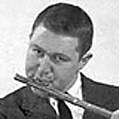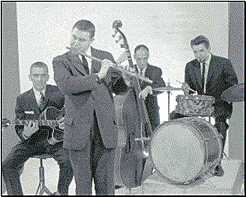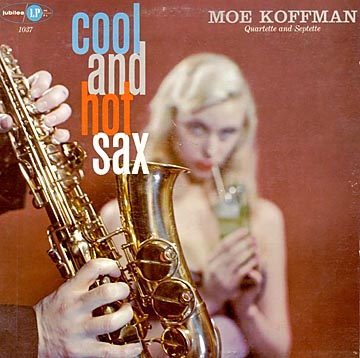Canadian Masters and their Works
Moe Koffman – Swinging Shepherd’s Blues – 1957 
Biography by Elaine Keillor
 Moe (born Morris) Koffman (28 December 1928, Toronto – 28 March 2001, Orangeville, ON) studied violin and then alto saxophone as a youth at the Toronto (later Royal) Conservatory of Music. Instead of finishing high school, he began to play with various Toronto bands including that of Horace Lapp at the Royal York Hotel and those of Luigi Romanelli who had become renowned after forming Toronto’s premier dance band at the
Moe (born Morris) Koffman (28 December 1928, Toronto – 28 March 2001, Orangeville, ON) studied violin and then alto saxophone as a youth at the Toronto (later Royal) Conservatory of Music. Instead of finishing high school, he began to play with various Toronto bands including that of Horace Lapp at the Royal York Hotel and those of Luigi Romanelli who had become renowned after forming Toronto’s premier dance band at the
King Edward Hotel in 1921. In the 1920s and 1930s Toronto’s connections with jazz were rooted in swing bands as unlike Montreal there were few Black musicians active. Black musicians could not join the musicians’ union until 1947 and were also not allowed to enter the premier hotels of Toronto.
In the 1940s, the one place in Toronto where more current developments in jazz occurred was at Clement Hambourg’s recording studio. In 1946 he opened The House of Hambourg, one of the first after-hours jazz clubs in Toronto. Later, it was there that Moe Koffman met Norm Amadio, Gordon Delamont,, Ron Collier, and Norman Symonds for bebop jam sessions. Bebop had emerged in New York in the early 1940s. It used a much richer harmonic vocabulary than that of swing bands and featured more improvisations along with several layers of rhythmic lines. In 1948 Koffman was named best alto saxophonist in a CBC poll and made his first recordings in Buffalo with American musicians. Becoming ever more fascinated with bebop, Moe Koffman went to its source in 1950 and remained in New York for five years. While based in New York, Koffman studied flute with Harold Bennett of the Metropolitan Opera Orchestra and clarinet with Leon Russianoff of the New York Philharmonic. He performed with big bands such as those of Jimmy Dorsey and Sonny Dunham.

Moe Koffman & His Quartet
Courtesy of Library & Archives Canada
Returning to Canada, he embarked on forming his own groups, usually a quintet or septet, and largely devoted himself to performing with them or in recording studios on a wide range of instruments. On 7 February 1957, he recorded the album Cool and Hot Sax with his septet at the RCA Victor Studios in Toronto. Among his own compositions included on this recording was “The Swingin’ Shepherd Blues” with Koffman on flute, Ed Bickert on guitar, Hugh Currie on bass, and Ron Rully, drums. Koffman originally had called this tune “Blues à la Canadiana” but his producer urged him to change it. This jazzy number went on to top the pop charts, the only jazz flute solo to ever do so. That success aided immensely in establishing the flute as a jazz solo improvising instrument, laying the groundwork for performers such as the Canadian Jane Bunnett.

In his subsequent career Koffman as one of the most respected musicians in Toronto appeared on some 30 recordings, and toured in Europe, Australia, North and South America. Particularly in the 1980s he frequently appeared with Dizzy Gillespie. Always straddling several musical worlds including that of popular, classical, and jazz, in the idiom of his compositions, in his choice of repertoire, and in his performing career, he did receive criticism from jazz purists. Koffman refused to be locked into the expected confines of any style. He was an avid exponent of circular breathing techniques and experimented with playing multiple instruments at once.
He appeared as a soloist with symphony orchestras, and on the Johnny Carson Show in the 1960s, and participated as a bass flutist in countless commercials, background music, and film and television soundtracks created in Toronto. He worked closely with Rob McConnell in arranging and creating new material. From 1972 to 2000 he toured with McConnell’s Boss Brass as an alto saxophone soloist. Meanwhile, he played flutes and other woodwinds in more pop-oriented recording sessions and gigs From 1956 to 1994, he was the booking agent for George’s Spaghetti House, a noted jazz venue in Toronto. For a decade after 1989, he booked the orchestral musicians to perform the musicals mounted by Garth Drabinsky’s Live Entertainment Corporation. Along with these duties, and his own performing career, Koffman continued to create new compositions. Among the most frequently heard were the opening and closing themes of the CBC program As It Happens called “Curried Soul” and “Koff Drops.”
For his compositions and his performing excellence, Koffman received the PRO Canada’s Wm. Harold Moon Award in 1981, the Toronto Arts award for music in 1991, a SOCAN award for songwriting in 1993, the Flutist of the Year Jazz Report awards in 1993 and 1994. In 2001 he was with Oscar Peterson the first inductee into Canada’s Jazz and Blues Hall of Fame.